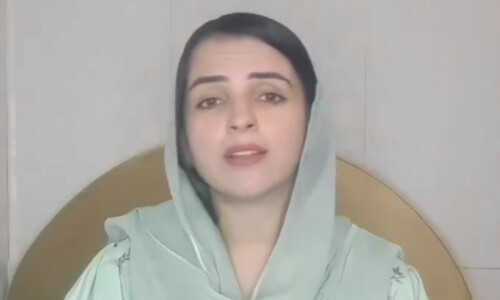UNITED NATIONS: Pakistan's President Asif Ali Zardari declared Tuesday before the United Nations that his country had suffered enough in its fight against extremist terror and should not be asked to do more.
“No country and no people have suffered more in the epic struggle against terrorism than Pakistan,” he insisted.
“To those who say we have not done enough, I say in all humility: Please do not insult the memory of our dead, and the pain of our living. Do not ask of my people what no one has ever asked of any other peoples,” he said.
“Do not demonize the innocent women and children of Pakistan. And please, stop this refrain to 'do more'.”
Beginning his address to the UN General Assembly with a denunciation of the recent American-made movie trailer and French cartoons that insulted the Prophet Mohammed (PBUH), he demanded that such material be banned worldwide.
Then, speaking next to a photograph of his late wife — Pakistani politician Benazir Bhutto, who was murdered by militants — he set about defending the Pakistani people's record in the war on violent extremism.
Zardari said regular US drone strikes against targets in his country made his task of selling the fight against terror to his people harder, as did the massive increase in Afghan drug exports since the US-led invasion.
“There are a lot of questions that are asked of Pakistan these days,” he said, his voice rising as he warmed to his theme.
“I am not here to answer questions about Pakistan. The people of Pakistan have already answered them. The politicians of Pakistan have answered them. The soldiers of Pakistan have answered them,” he declared.
“We have lost over 7,000 Pakistani soldiers and policemen, and over 37,000 civilians,” he added. “And I need not remind my friends here today, that I bear a personal scar.”
Pakistan has long been seen as a safe haven for myriad armed groups, whether Taliban fighting along the Afghan border, domestic extremists or Kashmiri Muslims bent on capturing Indian-held territory.
“I remember the red carpet that was rolled out for all the dictators,” he said. “These dictators and their regimes are responsible for suffocating and throttling Pakistan, Pakistan's institutions and Pakistani democracy.
“I remember the jailing of Pakistan's elected leaders. I remember the 12 years I myself spent in prison. And I remember the billions provided by the international community to support those dictatorships,” he said.
“My country's social fabric, its very character has been altered. Our condition today is a product of dictatorships.”
Zardari's government has often been accused in the West of not doing enough to fight armed extremism, and since bin Laden was found — in a garrison town near the capital — some in Washington have called for aid to be cut.













































